US spy chief reverses course, will not say how many Americans caught in NSA surveillance


US chief spy Dan Coats. (Image: pool report)
US Director of National Intelligence Dan Coats has refused to say how many Americans have been caught up in the government's surveillance programs, reversing a confirmation pledge he made earlier this year.
Security
Coats said at a hearing before the Senate Intelligence Committee on the reauthorization of a key foreign surveillance law that it is "infeasible" to provide an estimate of how many Americans' communications have been collected by the National Security Agency.
It's a key question that has been raised by senior lawmakers on several occasions of both the Obama and Trump administrations.
Sen. Ron Wyden (D-OR), a civil liberties and privacy advocate and member of the intelligence committee, has been asking for this information since 2011, when he first revealed that there was a "secret" interpretation of the Patriot Act. Thanks to disclosures by whistleblower Edward Snowden, we know that interpretation allowed the government to collect any "tangible" data from a company, like calling records from a phone company.
The senator criticized Coats for going back on his promise at his confirmation hearing to get a specific number on how many Americans were affected by the surveillance.
But Coats argued that in order to reveal the number of Americans caught up in NSA surveillance, the intelligence community would have to potentially violate the privacy of those whose data had been collected by verifying their identities.
It's the same argument the NSA gave in 2012 in response to lawmakers.
He added that shifting intelligence resources away from ongoing missions and gathering efforts would be "unjustified." In any case, he said that he does not believe it is possible "to come up with accurate measurable results."
The news was met with anger and frustration among many national security reporters and civil liberties lawyers and activists on social media -- many of which used language in response that is unprintable.
Wednesday's hearing comes as lawmakers press senior intelligence officials on details of the effectiveness of US surveillance laws, ahead of the scheduled expiry at the end of the year of a key foreign surveillance statute, known as Section 702 after its place in the law books.
Coats, in his opening remarks, confirmed that the Trump administration is pushing for a "permanent reauthorization" of Section 702.